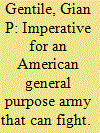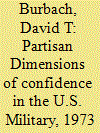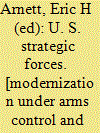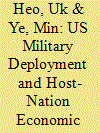|
|
|
Sort Order |
|
|
|
Items / Page
|
|
|
|
|
|
|
| Srl | Item |
| 1 |
ID:
089719


|
|
|
| 2 |
ID:
078704


|
|
|
|
|
| Publication |
London, Routledge, 2006.
|
| Description |
x, 194p.
|
| Standard Number |
0415393701
|
|
|
|
|
|
|
|
|
|
|
|
Copies: C:1/I:0,R:0,Q:0
Circulation
| Accession# | Call# | Current Location | Status | Policy | Location |
| 052586 | 341.584/ARB 052586 | Main | On Shelf | General | |
|
|
|
|
| 3 |
ID:
165024


|
|
|
|
|
| Summary/Abstract |
There are 22 million veterans in the U.S. Armed Forces. Past research on the musculoskeletal health of military veterans has explored the prevalence of musculoskeletal disorders (MSDs) but largely avoids situating findings within a theoretical framework. This article uses Pierre Bourdieu’s theory of cultural capital to contextualize veteran’s greater rates of MSDs compared to nonmilitary civilians. Cultural capital consists of objectified, institutional, and embodied capital that can be transubstantiated to capital in other areas. Embodied or physical capital is central to military service, and military veteran status is beneficial in accessing social and institutional capital. Using the 2012–2014 National Health Interview Survey, we show veterans are more likely to report activity-limiting MSDs, and at younger ages, compared to nonveterans. Physical capital is central to, and impaired by, status as a veteran.
|
|
|
|
|
|
|
|
|
|
|
|
|
|
|
|
| 4 |
ID:
002462


|
|
|
|
|
| Publication |
Boston, Branden Press, 1972.
|
| Description |
224p.
|
| Standard Number |
828313563
|
|
|
|
|
|
|
|
|
|
|
|
Copies: C:1/I:0,R:0,Q:0
Circulation
| Accession# | Call# | Current Location | Status | Policy | Location |
| 033934 | 355.020973/CHO 033934 | Main | On Shelf | General | |
|
|
|
|
| 5 |
ID:
165022


|
|
|
|
|
| Summary/Abstract |
Americans express more confidence in their military than any other institution. The components and causes of confidence have been little studied, especially as a partisan phenomenon. This study assesses trends in how partisanship and ideology affect confidence in the military. Multivariate analysis of General Social Survey and Harris Poll data shows that while confidence has increased for all demographic and political subgroups, partisanship and ideology play larger roles than commonly recognized. Democrats and Republicans are more confident than independents, but Republican confidence increased sharply over the last 20 years. Party ID is now the best predictor of one's confidence in the military. Conservative ideology has little effect, but liberalism reduces confidence, splitting Democrats. The pattern is not only “Republicanization,” however; partisans on both sides are more confident when their party holds the White House.
|
|
|
|
|
|
|
|
|
|
|
|
|
|
|
|
| 6 |
ID:
003027


|
|
|
|
|
| Publication |
Washington, D C, American Association for Advancement of Science, 1989.
|
| Description |
44p.
|
|
|
|
|
|
|
|
|
|
|
|
Copies: C:1/I:0,R:0,Q:0
Circulation
| Accession# | Call# | Current Location | Status | Policy | Location |
| 034635 | 355.00973/ARN 034635 | Main | On Shelf | General | |
|
|
|
|
| 7 |
ID:
006128


|
|
|
|
|
| Publication |
Washington DC, Centre for Strategic and International Studies, 1995.
|
| Description |
xv, 224p.
|
| Standard Number |
089206305X
|
|
|
|
|
|
|
|
|
|
|
|
Copies: C:1/I:0,R:0,Q:0
Circulation
| Accession# | Call# | Current Location | Status | Policy | Location |
| 037586 | 322.50973/SNI 037586 | Main | On Shelf | General | |
|
|
|
|
| 8 |
ID:
165023


|
|
|
|
|
| Summary/Abstract |
Since the end of World War II, the U.S. military has deployed its troops all over the world for regional security and/or peace building. Despite the importance of its political, economic, and military impact on the region, few studies examined how U.S. military deployment overseas affects the host nation’s economy except Jones and Kane (2012) and Kane (2012). To help fill the gap in the literature, we tested how substantial U.S. troop deployment (more than 100 troops on average) affects the host state’s investment, trade, political development, and economic growth for the period from 1960 to 2014, using the seemingly unrelated regression (SUR) model. The results show that the presence of U.S. troops does promote investment, trade, and economic growth in the host state. The United States deploys troops for regional security purposes, but these deployments also help economic growth directly and indirectly.
|
|
|
|
|
|
|
|
|
|
|
|
|
|
|
|
| 9 |
ID:
089716


|
|
|
|
|
| Publication |
2009.
|
| Summary/Abstract |
Our military is in reasonably good shape today, but it is working very hard and the level of individual sacrifice among soldiers and Marines, in particular, is very high. Were it not for the distinct likelihood of a major reduction in combined deployments to Iraq and Afghanistan by 2010, we would need urgent responses to the situation now. And if those missions go less well, or less quickly, than now hoped-or if, heaven forbid, another war breaks out in the meantime-additional measures will be required
|
|
|
|
|
|
|
|
|
|
|
|
|
|
|
|
|
|
|
|
|